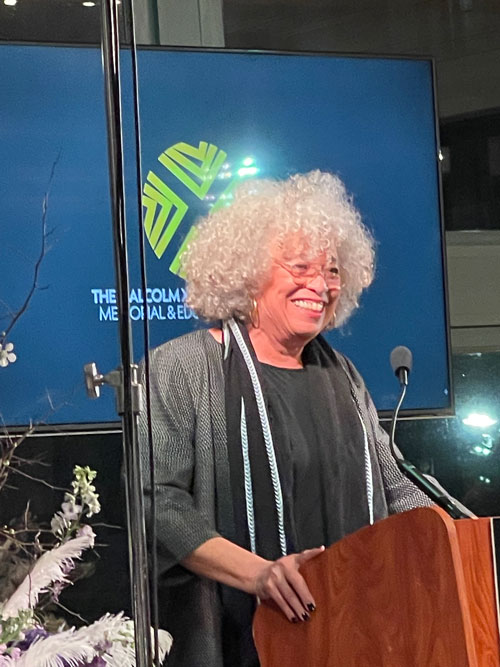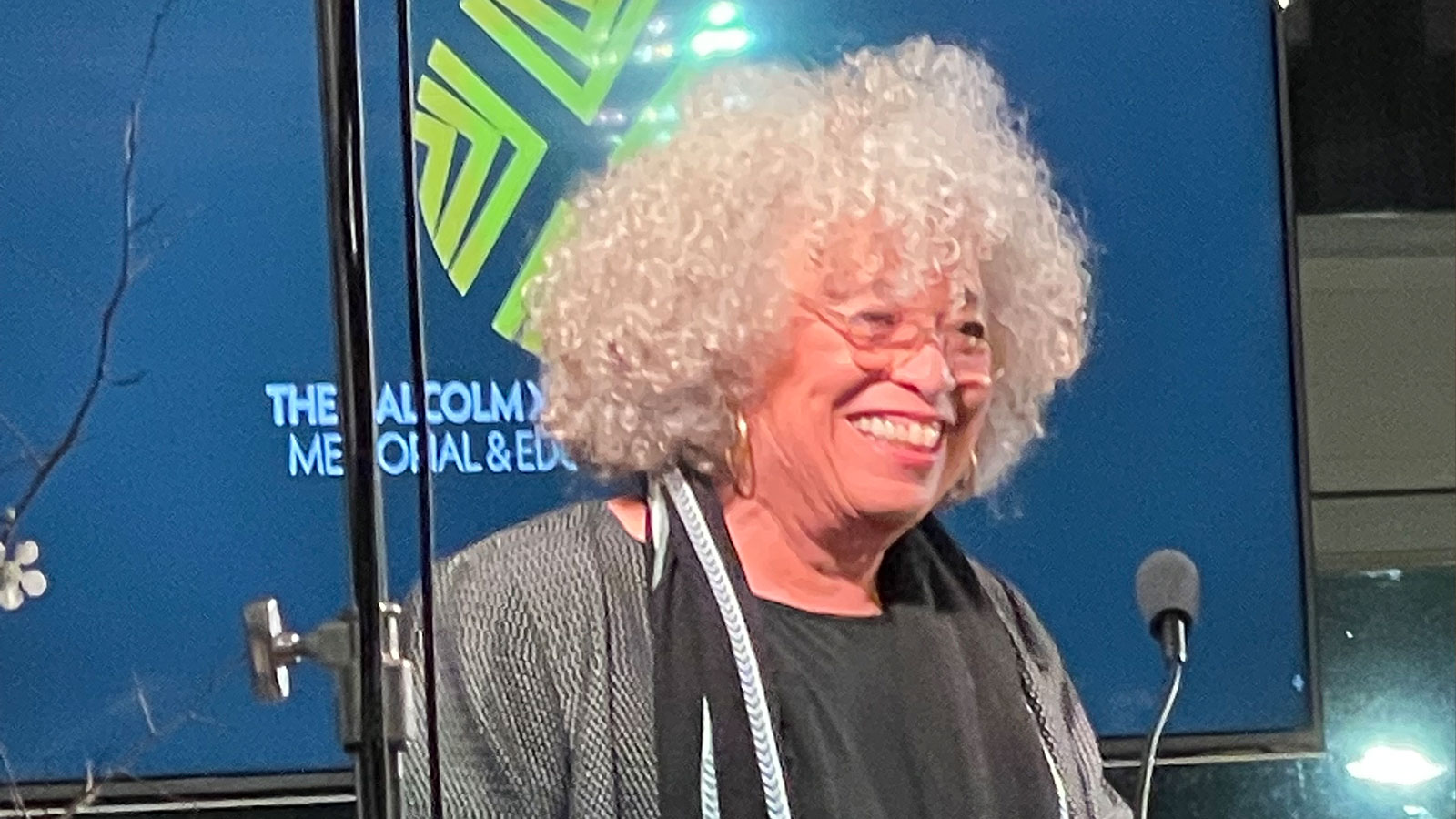“Living the Legacy” was the theme of the 58th Commemoration of El-Hajj Malik El-Shabazz, Malcolm X event Tuesday evening at the Shabazz Center. And speakers such as Attorney Benjamin Crump, poet Jessica Care Moore, MSNBC host Joy Reid, Democracy Now co-host Amy Goodman, Tamara Payne, the daughter of the late journalist Les Payne, Keynote Speaker Dr. Angela Davis, and moderator Marc Lamont Hill gave fresh vibrancy and resonance to Malcolm’s life and legacy. Their words and memories were received with enthusiasm by the massive audience.

Dr. Angela Davis
After the drums of the African Healing Circle and libations by Rev. Dr. Mother Khoshhali, and remarks by the Rev. Dr. Otis Moss, III, the evening was a dazzling display of erudition and moderator Hill moved the lengthy festivity along with smooth efficiency. News broadcaster Reid established a family tone to the occasion recalling that “My mother loved Malcolm X because she said ‘That’s a man…a man who will never stop loving you.’”
Love was also evoked by Ms. Payne, who like Reid was a recipient of a Vanguard Award from the Malcolm X and Dr. Betty Shabazz Center. “It was a labor of love,” she said of her father, whose book The Dead Are Arising, won a Pulitzer Prize. And Amy Goodman expressed her administration for the daughters of Malcolm and Betty—four of whom she said was in “this very place where Malcolm” was assassinated on Feb. 21, 1965. Attorney Crump extended the salutations to the Shabazz family and commented on his representation of Dr. Ilyasah Shabazz, and the 100 Million lawsuit they have filed against the NYPD, the CIA, FBI, and other governmental agencies as complicit in Malcolm’s death.
“That lawsuit,” Crump elaborated, “is let them know we will never forget Malcolm X.” He also briefly discussed his involvement in the case in Florida where on behalf of his clients he’s challenging Gov. Ron DeSantis and his decision to eviscerate the AP course in the school system.
Assad Koshul, co-founder of the Malcolm X Educational Curriculum, delivered a sample of the course, which with its graphics and visual complements promises to be very informative and engaging. Gwen Carr, the mother of Eric Garner, who was another Vanguard Recipient honoree, was unable to attend, but the moderator provided listeners with a summary of her commitment to other mothers who have lost children to police brutality.
The phenomenal poet and activist Jessica Care Moore offered her usual fare of brilliance and insight with her recitation of “We Want Our Bodies Back.” And this one stanza signifies the defiance and demand:
we want them anointed in oils
we want them wore around your neck
We want them remembered, we want them worshipped on Sunday.
we want our magic you try to bottle
we want our essence you attempt to steal
we want our elegance our sex our walk
we want our cool we want our recipes
our intelligence, our science, our stars, our history…”
It was perfectly aligned with Dr. Safiya Bandele’s reflections to the tribute to Dr. Betty Shabazz, and her words captured the essence of an educator and the lessons she left us. A harbinger of those lessons leaped from the remarks of Ana Coyanda-Parkzes, a Taft School Student leader. Her lecture was replete with quizzes where she asked the audience if it could recall certain heralded and unheralded African Americans.
Dr. Ilyasah Shabazz introduced Dr. Davis, who during her half-hour at the podium eloquently recounted the magic and majesty of Malcolm’s journey. She deftly placed him on a continuum of struggle and self-determination and love for his people. Malcolm was an “internationalist” she stressed, a courageous freedom fighter. Each word she uttered—racism, capitalism, sexism, colonialism, neo-colonialism, were often cited by Malcolm who always sought to put the African American struggle in a broad context. ““We know we cannot exclude any community that suffers from the effects of racism,” Davis said. “And this includes Asian Americans, and this includes Arab Americans. This includes Palestinians….and this includes nonhuman co-inhabitants of this planet.”
Toward the end of her speech—much of which she had discussed earlier on Democracy Now with Goodman and Juan Gonzalez—she stated “We’re on the verge of substantial shifts in the way people think about race and racism. And those who want to prevent these shifts from happening are frantically trying to turn back the clock.”
The only sound that could melodically mellifluously follow Davis was the trumpet of Keyon Harrold, and as he did last year, his horn echoed the evening’s theme of “Living the Legacy” in lilting, and sometimes haunting phrases. Closing comments and a call to action from Dr. Regina Jackson, a prayer from Imam Jaaber, and a drum recessional from the African Healing Circle and the turnout was turned loose, and down to the lobby where hot pans and succulent food gave the event a tasty conclusion.















